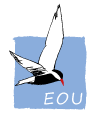Disentangling the drivers of life-history evolution in the wild: Artificial selection meets natural selection in a unique avian island population.
Full advertisement: http://www.exeter.ac.uk/studying/funding/award/?id=3658
Supervisors: Dr Erik Postma, Department of Biosciences, Centre for Ecology and Conservation, College for Life and Environmental Sciences, University of Exeter
Dr Jon Bridle, School of Biological Sciences, University of Bristol
Dr Jinliang Wang, Zoological Society of London,
Prof Marcel Visser & Prof Arie van Noordwijk, Netherlands Institute of Ecology
Location: University of Exeter, Penryn Campus, Penryn, Cornwall, TR10 9FE
Project Background: Despite a large body of theory describing how genetic variation and selection shape adaptive evolution, theoretical predictions often appear to be at odds with what we observe in real-world populations. Although the apparent ubiquity of so-called evolutionary stasis (i.e. selection and heritability but no evolution) has triggered many attempts to refine our predictions by incorporating the complexities that are typical of wild populations, this crucially assumes that evolution is in essence predictable. However, is natural selection strong enough to overcome the effects of random drift and gene flow, especially in small populations? Being able to answer this question is crucial if we are to advance our understanding of the ability of populations to persist in a world changing at unprecedented rates, and the evolutionary process in general. … [read more]
Eligibility: Students who are resident in EU countries are eligible for the full award on the same basis as UK residents. Residency rules are complex and if you have not been resident in the UK or EU for the 3 years prior to the start of the studentship, please apply and we will check eligibility upon shortlisting.

Recent Comments